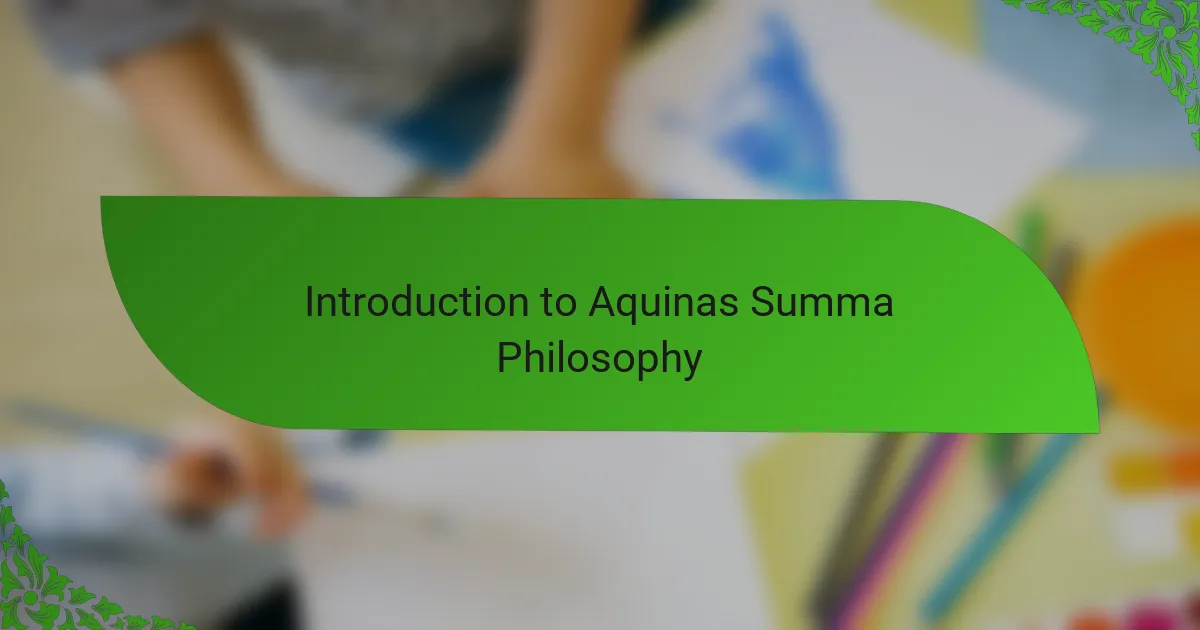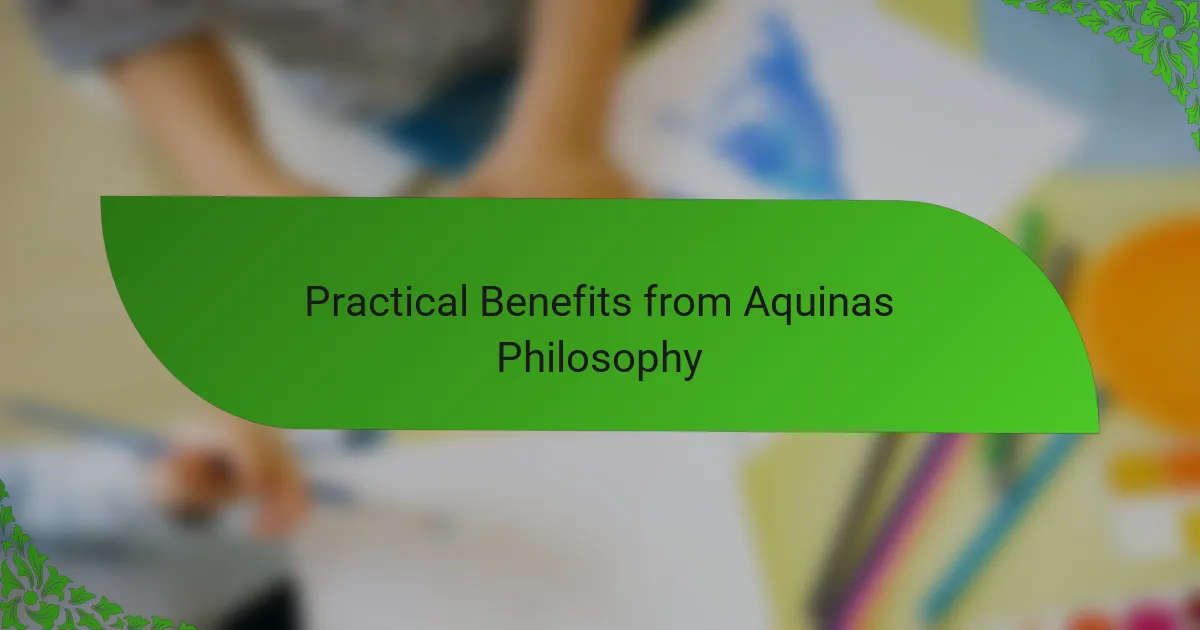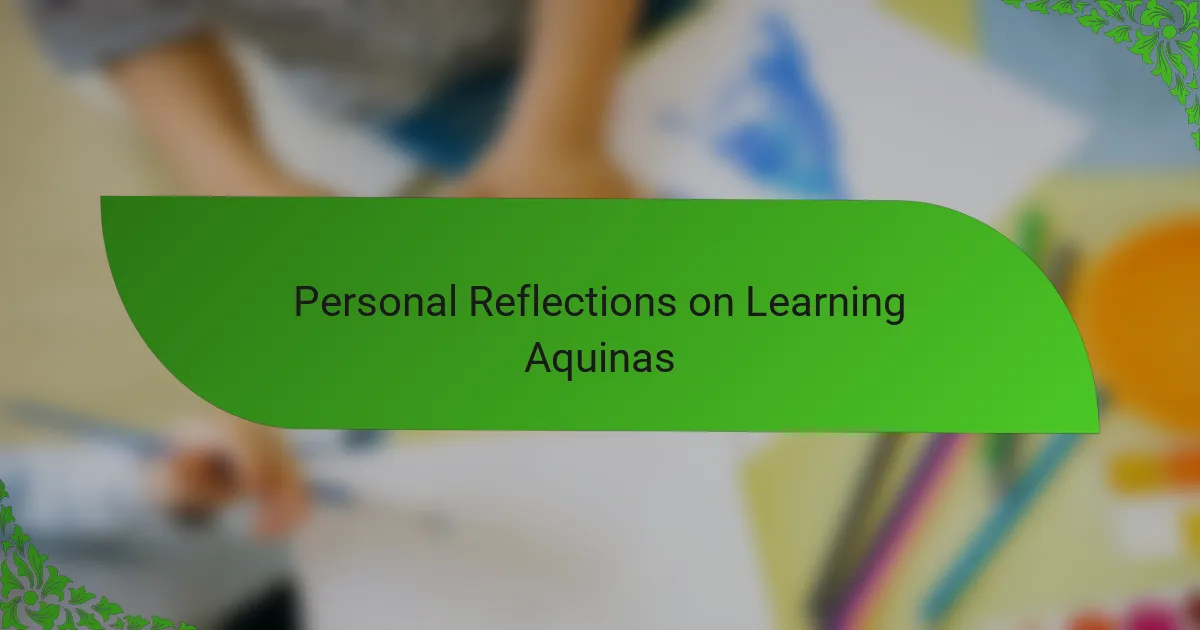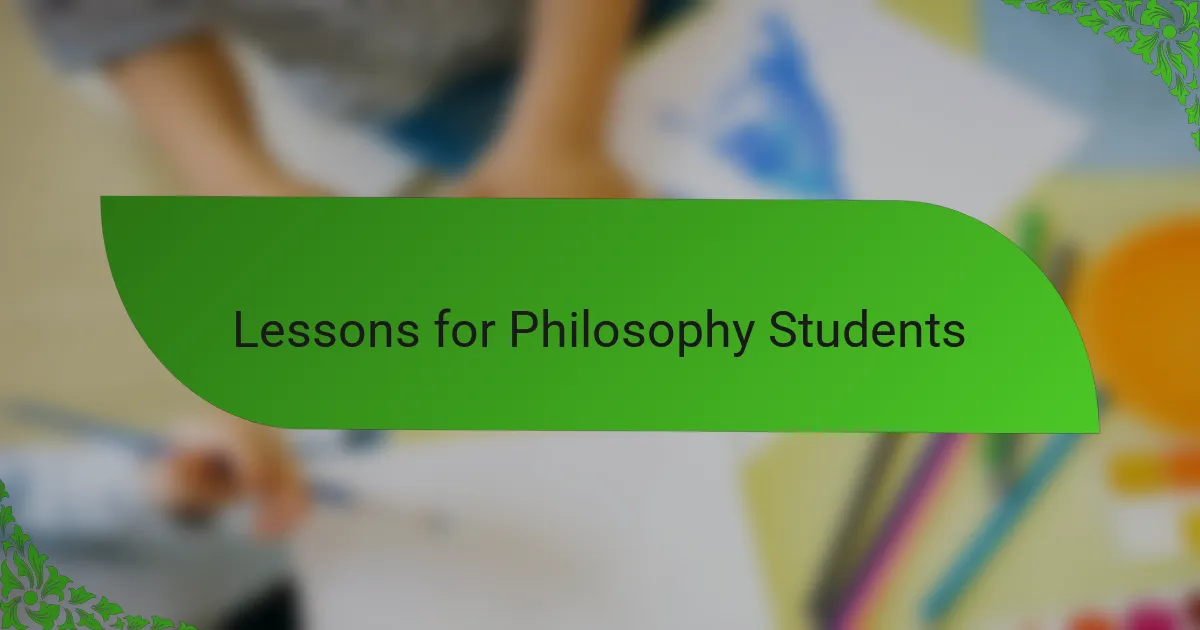Key takeaways
- Aquinas’s method emphasizes structured questioning and dialogue, transforming philosophical inquiry into a collaborative and engaging process.
- Key concepts like “essence” and “existence” and the “unmoved mover” invite deep reflection on the nature of reality and causality.
- Studying Aquinas cultivates patience, humility, and critical thinking, enabling a deeper understanding of complex philosophical and ethical dilemmas.
- Philosophy serves not only as intellectual pursuit but also as a character-forming practice, promoting personal growth through the struggle with challenging ideas.

Introduction to Aquinas Summa Philosophy
Diving into Aquinas’s Summa Theologica felt like stepping into a vast cathedral of thought, where every question seemed to echo with centuries of inquiry. Have you ever pondered how reason and faith intertwine? That’s exactly what Aquinas explores with such rigor, breaking down complex theological and philosophical issues into approachable segments.
What struck me most was the structured clarity Aquinas brings to profound topics—each “article” feels like a conversation guided by respectful questioning rather than dogmatic assertion. It’s like having a thoughtful mentor who gently challenges your assumptions and invites deeper reflection. This method made me realize how philosophy, at its best, is not about having all the answers but about engaging in a relentless pursuit of truth.
Reading Summa isn’t always easy; I encountered moments of frustration when ideas seemed dense, yet those challenges deepened my appreciation. It’s a reminder that philosophy often demands patience and willingness to wrestle with tough questions—qualities that shape both the mind and character. Have you ever felt that kind of struggle that leads to growth? That’s exactly the journey Aquinas’s work encourages.

Understanding Key Philosophical Concepts
One concept that stood out to me was Aquinas’s idea of “essence” and “existence”—how things don’t just have a nature but must actually exist to realize that nature. At first, this distinction felt subtle and almost abstract, but it slowly reshaped how I think about being itself. Can you imagine how this reframes the way we understand existence beyond mere appearance?
Another key idea I grappled with was Aquinas’s notion of causality, especially the “unmoved mover” or first cause. This wasn’t just a dry philosophical argument but a profound invitation to consider the origin of everything we see. Reflecting on this, I found myself connecting dots not only in philosophy but in everyday moments—how do you explain the chain of events when everything seems to have a cause?
What really anchored these concepts for me was the method Aquinas used—posing objections before responding thoughtfully. This dialectical style felt like a dialogue rather than a lecture, encouraging me to question my own assumptions openly. Have you ever engaged with a text that didn’t just deliver answers but invited you into its reasoning process? That’s the kind of understanding I found with Aquinas, making complex ideas feel alive and relevant.

Applying Aquinas in Education
When I first tried to bring Aquinas’s method into the classroom, I noticed how his question-and-answer approach transformed discussions from lectures into conversations. Students weren’t just memorizing doctrines; they were genuinely wrestling with ideas, much like I did reading the Summa. It felt rewarding to watch them shift from passive listeners to active thinkers.
I also found that applying Aquinas’s emphasis on reason and faith helped bridge gaps between different subjects. For example, in ethics classes, we explored moral questions by balancing logical analysis with personal values—just as Aquinas balanced theology and philosophy. Have you ever seen how this balance sparks unexpected insights among learners? It definitely made the material more relatable and meaningful.
Using Aquinas’s dialectical style requires patience from both teacher and student, but the payoff is worth it. I remember moments when a challenging question led to a breakthrough in understanding, not just for one person but for the whole class. Those moments reminded me why philosophical education isn’t about quick answers but about nurturing thoughtful, reflective minds.

Challenges in Studying Aquinas Summa
Studying the Summa Theologica wasn’t without its hurdles. I often found myself tangled in Aquinas’s dense Latin phrasing and intricate arguments, which sometimes felt like deciphering an ancient puzzle without a key. Have you ever been so absorbed in a text that each paragraph feels like climbing a steep hill? That’s the mental stamina Aquinas demands.
At times, the sheer scope of topics—from metaphysics to ethics to theology—was overwhelming. It wasn’t just learning isolated ideas but connecting them across vast conceptual landscapes. I remember feeling stuck wondering, “How do all these pieces fit together?” This challenge pushed me to slow down, reread sections, and embrace the complexity rather than shy away from it.
Another struggle came from balancing faith and reason in my own mind as Aquinas intended. Wrestling with questions that have no easy answers tested my patience and sometimes left me unsettled. Yet, this tension was also where the deepest insights emerged. Isn’t that what true philosophical engagement is about—leaning into discomfort to uncover deeper clarity?

Practical Benefits from Aquinas Philosophy
One practical benefit I gained from diving into Aquinas’s philosophy is how it sharpened my critical thinking. His rigor in questioning every premise made me more careful with my own assumptions, pushing me to look beyond surface answers. Have you ever noticed how a structured approach to questions can transform a vague opinion into a clear argument? That’s exactly what Aquinas’s method did for me.
I also found that Aquinas’s blend of reason and faith offered a unique way to navigate everyday ethical dilemmas. Instead of feeling torn between strict logic and personal values, I learned to hold both perspectives in tension, which brought me greater clarity and confidence in decision-making. Can you imagine how freeing it is to engage moral questions without feeling boxed in by either emotion or cold rationality?
Another unexpected benefit was how Aquinas’s philosophy cultivated patience and humility in my learning process. Wrestling with complex ideas wasn’t always comfortable, but over time, I discovered that this struggle deepened my understanding and resilience. Isn’t it interesting how confronting difficulty head-on often leads to the most meaningful growth?

Personal Reflections on Learning Aquinas
There were moments when I felt completely awed by Aquinas’s intellect, yet also strangely comforted—as if I was not alone in wrestling with life’s biggest questions. Have you ever sensed that sense of companionship in a thinker from centuries ago? That connection made my study feel deeply personal, not just academic.
At times, I struggled with the precision Aquinas demands, questioning whether I could ever match his clarity. But then I realized that the real value lay not in immediate mastery, but in patiently embracing the process. Doesn’t that remind you how growth often comes from persistent effort over time?
Reflecting back, engaging with Aquinas sharpened more than just my intellect; it shaped my character too. The discipline, humility, and openness required to learn from him quietly transformed how I approach not only philosophy but life’s uncertainties. Have you found that true learning often challenges who you are, not just what you know?

Lessons for Philosophy Students
One lesson I came away with is the vital importance of patience in philosophical study. Aquinas’s work doesn’t hand you quick answers—instead, it invites you to dwell with difficult questions, to sit with uncertainty. Have you ever experienced that feeling when a tough question keeps nudging you, urging you to look deeper? That’s exactly the kind of perseverance philosophy students need to cultivate.
Another insight that struck me is the power of structured dialogue. Aquinas’s method of raising objections before responding opened my eyes to how productive respectful disagreement can be. When I tried this approach in study groups, conversations became richer and more dynamic—people stopped trying to “win” and started exploring ideas together. Could adopting this dialectical mindset transform how you engage with challenging texts?
Lastly, I learned that philosophy isn’t just an intellectual exercise; it’s a practice that shapes one’s character. Wrestling with Aquinas made me more humble and open-minded, qualities I believe every philosophy student should nurture. After all, isn’t the ultimate goal to grow not only in knowledge but in wisdom? That’s a lesson I carry with me well beyond the pages of the Summa.